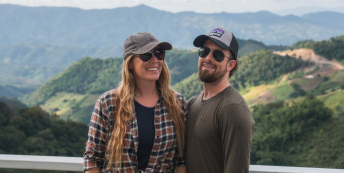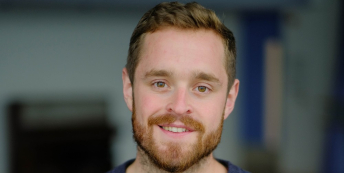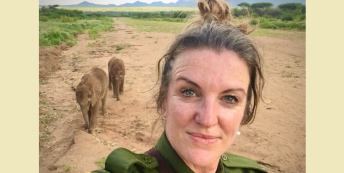“I couldn’t distinguish between what I'd decided for my career and what I’d been pushed into.”

What work were you doing previously?
I'd spent about 23 years working in healthcare communications and marketing.
I started at a big 50k+ employee healthcare manufacturer in my early twenties, and then found myself going to smaller companies until I eventually ended up at a small six-person marketing agency.
At my last job, I spent 50 percent of my time working with people from the company I started my career at, and the other 50% of the time working with the company I'd worked at during my second job. I was still very much in the corporate world I'd been trying to get away from.
What are you doing now?
I have a portfolio career.
I write about travel and parenting, and have three publications that I write for.
I also do some freelance marketing work, and at the pro bono level I'm exploring working with people at the very early stages of career change.
Why did you change?
I worked in worlds where you were identified as high potential and the next thing you know your job's changed.
It was supposed to be this marvelous thing, but it wasn't anything you decided, it was just 'you should want this'.
People would kind of find what you're motivated by and manipulate accordingly with increasing hours, the amount of work, and even the type of work.
Eventually I couldn’t distinguish between what I'd decided for my career and what I’d been pushed into. I don't think I realised until I'd been away from it for at least a year that I'd been manipulated in that way.
I had other people telling me what my job was going to be for so long. I finally got to a point where I asked myself ‘What do I want to do?' versus what someone else thinks I should be doing.
How did you choose your new career?
I took part in the Career Change Launch Pad and once it was over, I felt I needed time to absorb the course and everything we'd gone through.
I wondered 'is the problem that I don’t want to do marketing, or is it the organisations I've done it in?'. I accepted that the work environment was a factor in this.
Also, I didn’t want to just work for one company in one role. I wanted to think of writing as a source of income, but not the only source. That helped me open up to the idea of a portfolio career. I started to wonder what that could look like.
When my first writing pitch for a publication I'd never written for before was accepted, that gave me the feeling of 'oh, this could be something’. I got a request from a small business asking me to do consulting with them. It was small things that came together that helped me know that this is possible.
And I focused on resonance – what I liked to do, what gave me energy, and being honest with myself about that. I'd never measured jobs that way before. And that enabled me to say no to work that wasn't right for me.
Are you happy with the change?
I’m very happy with my career change.
Friends, former colleagues, my yoga teacher, people I’ve known for years comment on the change in me. Even my kids have noticed a change in me – I can actually relax, am far less stressed, I’m curious and regularly trying new things.
This is the first time I have a career that was my decision. It’s not driven by bosses or a company culture telling me what I should be doing or telling me my career goals.
I’m not bored. Doing the Launch Pad helped me realize interests I wasn’t exploring and got me thinking differently about work, especially around having a single source of income. I know now I like having multiple sources of income and a lot of variety.
How did you go about making the shift?
I didn’t realize I’d been planting the seeds of making a career shift for almost seven years.
I started writing books before the pandemic, while still working in healthcare marketing, which helped me get a role as a freelance writer for a print magazine.
That led to writing for the magazine’s blog. Between a monthly column in print and a 50%+ blog pitch acceptance rate, I realized I could be doing more writing if I just had the time and headspace.
I also didn’t think of writing as a job or source of income, it was just something fun I did and got a little pay for it.
When I left my job in the corporate world, I had more time to write but was honest with myself that I wasn’t sure that was the only job I wanted. I’d been doing research on career change and career change workshops, and found Careershifters. I did the workshop and then joined the Launch Pad last year.
The Launch Pad changed everything for me. For the first time I was exploring ideas related to careers, not just focusing on how to get my next promotion or make more money. I was asking myself what I wanted from work and thinking about work differently.
Completing the Launch Pad helped me with the confidence and momentum to lock in on a portfolio career and figure out how I wanted that to take shape.
There was a little bit of time where I didn't think it was going to happen or take off.
I was sending writing pitches and no one was accepting them. I’d talked with a few small businesses about marketing consulting but their needs were different from the kind of work I wanted to do. Then within a two week time period all these opportunities came in at the same time.
I decided to pace myself and start with one new opportunity at a time. This has been really helpful because it gives me the chance to reflect on and assess the projects I do, and gives me the time and headspace to be open to other opportunities that pop up.
I had my first piece published in Business Insider about career change which felt really amazing, and since then I've had people reach out to me on LinkedIn thanking me for the article. This feels so satisfying and different from some of the things I've done in the past.
How did you handle your finances to make your shift possible?
I decided to delay the departure from my company by a month so I’d receive my full bonus.
It was a sacrifice that was well worth it. I set that money aside for my career shift and exploration.
My husband and I also looked at our finances to see what we could rearrange and places to cut costs so I could take time off and not having my shift focused on needing to make what I did previously.
I live in the US and a big factor here is health insurance costs. I’m fortunate I’m able to get health insurance through my husband’s work. I’ve met other career changers from the US that don’t have that option. Many discovered they were staying in jobs they hate because of health insurance.
One change they made was to buy health insurance independent of their company. That freed them up from health insurance being a major criteria for a job. This opened them up to exploring smaller companies, start-ups, or portfolio careers.
What was the most difficult thing about changing?
Getting out of my own way and out of my own head.
I found ways that help me accept and overcome those feelings, for example I do a yoga class on Mondays as Mondays tends to be a harder day mentally for me.
Also being honest with myself and having patience with myself. This is something I can do for other people but don't usually do for myself.
I also know I have the Careershifters community to go to as a resource for support.
What help did you get?
The Launch Pad coaches were a huge support throughout the Launch Pad and also all of the folks in my Launch Pad cohort.
Everyone was incredibly engaged and supportive of each other. We’ve supported each other on bad days, been accountability buddies, and I’ve connected with people I would have never known otherwise.
My yoga teacher, former colleagues and my family have all became a support throughout the process.
What have you learnt in the process?
I think one of the biggest lessons for me is approaching life differently, not just work.
As I was meeting new people and trying new things as part of making the shift, I tried to apply that also to life in general and through this have made new friends.
Also knowing that you're not alone in thinking and feeling this way. That imposter syndrome is real, and it's important to communicate these things.
I didn't realise that my teenager was dealing with imposter syndrome and negative self-talk. They said that by me sharing my struggles and being open about similar feelings, it's helped them.
It's an incredible feeling to know you've been able to help your kids.
From a practical aspect as a freelance writer, one of the big things I’ve learned with selling and pitching as a freelance writer is to learn what my editors are looking for and document it.
When I have a successful writing pitch I notice what were the things that played into that – the days of the week they’re most responsive, how did I word it, does this person have a particular way they want me to structure the note I send them etc.
What would you advise others to do in the same situation?
Schedule time for exploration and making it a priority.
I made a goal for myself when I left my job to try one new thing every week for a year and I've had many memorable moments.
I have a list of people in my life who are always up to new experiences. When I feel stuck for new things to do I can hit them up for ideas.
I moved away from a paper calendar for the first time and went fully digital! I think getting rid of the paper calendar freed me from having to look at each day or week and feel like I have to fill that time (which was an old mentality I had).
If you move into a portfolio career and/or the freelancer / contractor space, you need to schedule your time. I block out time in my digital calendar for writing, research, for pitching etc.
Never forget, especially at the beginning, that you’re brave for making a shift. One of my connections told me that about 60% of people talk about doing it, and out of that only about 10% of people actually do.
So even when it's hard, remember how brave you are and you're doing something most people for whatever reason don't try doing. It can be scary but it’s an incredible journey.
Trisha took part in our Career Change Launch Pad. If you're ready to join a group of bright, motivated career changers on a structured programme to help you find more fulfilling work, you can find out more here.
What lessons could you take from Trisha's story to use in your own career change? Let us know in the comments below.



